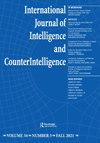罗马尼亚议会情报监督:在巩固与争议之间
IF 0.5
Q4 INTERNATIONAL RELATIONS
International Journal of Intelligence and Counterintelligence
Pub Date : 2023-05-08
DOI:10.1080/08850607.2023.2202344
引用次数: 0
摘要
本文章由计算机程序翻译,如有差异,请以英文原文为准。
Parliamentary Intelligence Oversight in Romania: Between Consolidation and Controversy
Abstract Romania represents one of the paradigmatic cases where security sector reform proceeded quickly after the collapse of the communist regime in 1989. The former Securitate was one of the most repressive intelligence services in the communist bloc and drastic reform was necessary in order to establish an efficient and trusted domestic intelligence service. Previous research by Bruneau and Matei highlighted the important steps that Romania has undertaken over the past years and argued that an efficient and robust oversight system has been built. This article addresses contemporary debates on factors triggering reform in parliamentary intelligence and focuses on Romania’s 2017 reforms. These reforms can be analyzed through the application of the “fire alarm/police patrol” model developed by Loch K. Johnson for changes in congressional oversight. By increasing and clarifying the power of the Joint Standing Committee for the Oversight of the Romanian Intelligence Service, the 2017 changes brought more clarity and more accountability to the oversight system. After 2017, the committee reverted to a “police patrol model” focusing on visits to intelligence sites and meetings with high-level intelligence officials.
求助全文
通过发布文献求助,成功后即可免费获取论文全文。
去求助
来源期刊

International Journal of Intelligence and Counterintelligence
INTERNATIONAL RELATIONS-
CiteScore
1.00
自引率
22.20%
发文量
102
 求助内容:
求助内容: 应助结果提醒方式:
应助结果提醒方式:


